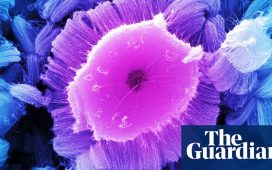Scientists have launched a clinical trial to assess a potential new treatment for endometriosis – the first in four decades.
Researchers from the universities of Edinburgh, Aberdeen and Birmingham plan to see whether the drug, dichloroacetate, can help manage pain among those with the condition.
If successful, the drug could be the first ever non-hormonal and non-surgical treatment for endometriosis – and the first new treatment in 40 years.
Around 100 women with the condition will be invited to join the trial.
Endometriosis UK estimates that the condition affects 1.5 million women in the UK.
It is a condition where tissue similar to the lining of the womb grows in other places, such as the ovaries and fallopian tubes. It is a life-long condition that can cause serious pain and discomfort.
The tissue, known as endometriosis lesions, acts as endometrial tissue would — it thickens, breaks down and bleeds with each menstrual cycle which leads to inflammation, pain and the formation of scar tissue.
The new research, which has been funded by Wellbeing of Women and the Scottish Government, will begin in the autumn.
Half of women enrolled in the trial will be given dichloroacetate, a drug previously used to treat rare metabolic disorders in children, while the other half will be given a dummy drug.
Previous work has found that that cells from the pelvic wall of women with endometriosis produce higher amounts of lactate – a chemical generated by the body to provide energy when there is a lack of oxygen.
Our research so far shows promising results that dichloroacetate can make a huge difference. I hope our new trial will confirm this and give women hope that new treatments and a better quality of life are on the horizon
Dr Lucy Whitaker
It is thought that this creates an environment that supports the development and growth of endometriosis.
And researchers have previously found that when endometriosis cells were treated with dichloroacetate, lactate production decreased to normal levels and the size of the endometriosis lesions were reduced.
It is completely unacceptable that there have been no new treatments for endometriosis in 40 years
Janet Lindsay, CEO of Wellbeing of Women
Study lead, Dr Lucy Whitaker, Wellbeing of Women researcher and clinical lecturer at the University of Edinburgh, said: “We know women with endometriosis desperately want more treatment options and better ways to manage the often-debilitating pain that it causes.
“Our research so far shows promising results that dichloroacetate can make a huge difference.
“I hope our new trial will confirm this and give women hope that new treatments and a better quality of life are on the horizon.”
Janet Lindsay, chief executive of health charity Wellbeing of Women, added: “It is completely unacceptable that there have been no new treatments for endometriosis in 40 years.
“Too many women and girls are suffering from debilitating symptoms, such as chronic pelvic pain, fatigue and even fertility problems, and current hormonal and surgical treatments aren’t suitable for everyone.
“Endometriosis is an extremely under-funded area of women’s health, so we are very pleased to partner with the Scottish Government and invest in medical research that could transform how the condition is treated for millions of women.”
Maree Todd, women’s health minister for Scotland, said: “Scotland is the first country in the UK to introduce a Women’s Health Plan, with endometriosis being one of its early priorities.
“The plan includes several actions to help improve care and support for those with endometriosis, including a vital action to invest in further research to develop much-needed improvements into treatment and management options for the condition.
“I am pleased that we are jointly funding research with Wellbeing of Women into what could be the first non-hormonal treatment for endometriosis. It is a stepping stone to ensuring that those with endometriosis are given treatment choices that suit their needs.”











